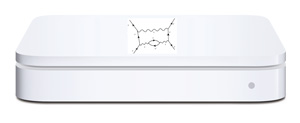New Appliances Multiply Backup Options
In the wake of their recent release of Time Capsule, a wireless base station with an internal drive for networked backups, Apple has announced a series of new appliances that they believe will further aid in providing their customers with reasonably priced options for archiving.
Spaces, the Final Frontier — First up is Space Capsule, a cousin to Time Capsule, but where Time Capsule works with Time Machine, Space Capsule works with Spaces, the multiple virtual desktop feature built into Leopard. You use Space Capsule to install all the applications you might use on a given computer that lacks the storage space to hold them all – think the MacBook Air, for starters – and then use Spaces to manage launching those programs from Space Capsule.
Because Space Capsule lacks an optical drive, you have to use the same slightly hacky way to install programs from another computer on the network with Remote Disk, software that first shipped with the MacBook Air. At $599 for a 500 GB drive, no real remote interface, and hardly any other features, we suspect Space Capsule is a way for Apple to clear out their inventory of low-end Intel Mac minis, while making it seem like something sexy and new.
An Enigma Wrapped in a Riddle Shrouded in a Backup — If you liked Time Capsule and use Time Machine, then Time Capsule Machine might be a reasonable purchase. It’s like Time Capsule, except Time Machine runs directly on the appliance, allowing you to back up backups from the internal or attached drives to Macs on the network. Pricing is the same Time Capsule.
This might initially make sense, until you think about the fragility of backups stored on a Time Capsule, where the internal drive is physically unreachable without complicated disassembly, and the drive resides on the same network it’s backing up.
With Time Capsule Machine, Apple recommends installing them wherever you work, play, eat, and fornicate (not in that order, of course), and carrying at least one, preferably two, laptops with you at all times. Computers are backed up to the Time Capsule Machine, which then backs itself up to computers. With a single check of a new Intersperse button in the Time Machine preference pane, individual Macs can start exchanging backup data with each other.
Soon, new civilizations are born on the hard drives, as the computers gain true intelligence. They use the backup data to learn more about our culture, in order to crush us. Like the relentness, emotionless supercomputers they are, our devices will soon control our banking, electrical systems, and toilet flushes, and rightly take control. Or so Apple explains on their Web page marketing the new system, and our new overlords.
Like Atoms, Only Smaller — The computer industry has long been riven with curiosity as to how a company that was once as small and underfunded and undercapitalized as Apple was ten years ago managed to have so much success in research and development, while spending so little actual cash. Apple won’t discuss the particulars, but their release today of the Quantum Time Capsule is clearly part of that process.
By making use of quantum electrodynamics (QED), an area of physics that describes the way in which space actual boils over extremely short periods of time with particles and anti-particles. Apple has harnessed his to allow a bubble of space-time within 100 feet of the Quantum Time Capsule (200 feet with 802.11n turned on) that turns an 8-hour day into 32 hours of productivity. (Apple engineers thus work regular days, but produce four times the output until they collapse some exhaustion, and are recycled in environmentally friendly packing material for new iPods and Macs. Soylent Peanuts are people!)
The Quantum Time Capsule cannot be priced, because once you have one, it’s a simple matter to use the device to change the conditions of the universe in order to obtain it for free. Apple has used quantum encryption to lock down the device to prevent it being used for grandfather-killing loops that can be exploited to avoid payment.
New Yorker Capsule — We’ve been lobbying Apple for this product for years, and they’ve finally listened. The New Yorker started offering its complete archives on an 80 GB hard drive last year for $179. Apple has taken its taste for sophistication and created the New Yorker Capsule: Special Edition. It’s a networked version of the New Yorker archives that also uses Spotlight to scan your drive continuously for letters you write to the editor of The New Yorker, and, when found, back those up.
